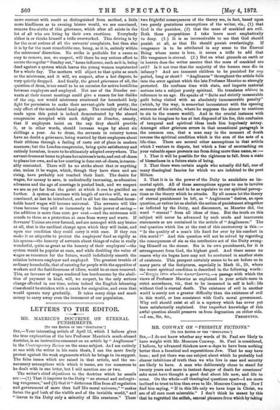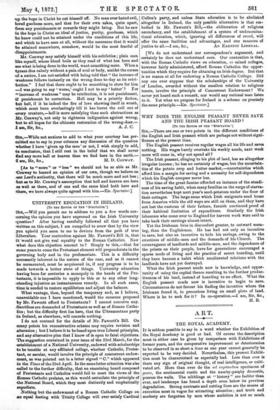MR. CONWAY ON " PRIESTLY FICTIONS."
[TO THE EDITOR OF THE " SPECTAT010]
SIR,—I do not know whether any words of St. Paul are likely to have weight with Mr. Moncure Conway. St. Paul is considered, I believe, by advanced thinkers now-a-days to have been nothing better than a fanatical and superstitious Jew. That he may have been ; and yet there was one subject about which he probably had clearer intuitions of truth than we who live in ease and security are likely to have. A man who deliberately chose to stand for twenty years and more in instant danger of death for conscience' sake must have thought a good deal about life now, and life to come. On the whole—all theological questions apart—I am more inclined to trust to him than even to Mr. Moncure Conway. Now I find him saying, "If in this life only we have hope in Christ, we are of all men most miserable." I don't think he meant by this that he regretted the selfish, sensual pleasure from which by taking sip the hope in Christ he cut himself off. No man ever hated evil, loved goodness more, and that for their own sakes, quite apart, from any punishments or rewards they might bring. But he saw in the hope in Christ an ideal of justice, purity, goodness, which 'he knew could not be attained under the conditions of this life, and which to have seen at all, without the assurance that it would be attained somewhere, somehow, would be the most fearful of disappointments.
Mr. Conway may satisfy himself with his subtleties ; plain men like myself, whose blood boils as they read of what has been and aee what is being done in the world, want something more. When a tyrant dies calmly without a pain of soul or body, amidst the curses of a nation, I am not satisfied with being told that " the increase of weakness follows instantly on the wrong done to-day as its retri- bution." I feel that there ought to be something in store for him —I was going to say worse,' ought I not to say better' ? For ."increase of weakness " may be retribution, it is not punishment, if punishment be correction. Hell may be a priestly fiction, but hell, if it be indeed the fire of love showing itself in wrath, which must burn everlastingly till it has burnt the evil out of .every creature,—hell is more satisfying than such abstractions as Mr. Conway's, not only to righteous indignation against wrong, but to all hopes for the ultimate restoration of the wrong-doer.—



































 Previous page
Previous page